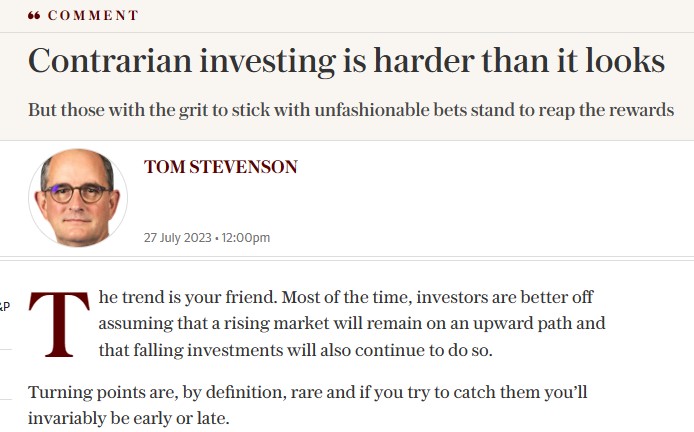So, credit agencies have downgraded the US for its financial stability and the market there has taken a turn downwards. What does it mean? Of course we shall be assessing that as we do our utmost to manage clients’ investments wisely and their financial affairs. However, it’s a blow for Mr Biden’s hopes for the economy and international confidence.
Over here, when will interest rate increases stop – they must be peaking now that inflation finally seems to be edging downwards, though the swingeing pay increases will still be feeding their way through the system in increased costs of the goods and services we buy.
Well, on the advent of the new Consumer Duty obligations upon the financial industry, we learn that senior executives and staff at one of the Country’s biggest financial institutions were happy believing the rules don’t apply to them. The Nigel Farage matter – like him or not – is not acceptable and thank goodness something is being done about ‘it’ to bring these entities into check. We are excruciatingly careful about what we do or don’t disclose to people and even about who is or is not a client as well. It is no business of third parties, whether press or not as that, in itself, is also confidential information as that could infer the client would need financial advice perhaps and thus have funds. Then it seems too these same people are prepared to tell mistruths to try to substantiate their position.
At least some have fallen on their swords but what a foolish way to go (entertaining too the Chairman of Nat West, Sir Howard Davies, is the ex-CEO of what is now the FCA!). I joined an industry where simple integrity stood for something – even if yes, there were plenty of cowboys in the old days and there will always be cowboys however hard the regulators work to weed-them-out (and as long as the honest amongst us don’t pay too horrendous a price for their misdemeanours). No one is perfect as much as we may strive but for us too, ‘my word is my bond’ still stands, very much. If you are not our client, I hope that is the trust you feel with your adviser – if it is not, then find one in whom you can trust that they have your best interests at heart and not their own.
Pleasingly, the message seems to be resonating better regardless – not only to use a regulated adviser (don’t fall for investment scams, however attractive they sound and whether property related or not too – you don’t have protections when something goes wrong). The FCA notes that 4.4million people received regulated financial advice in 2022, up 16% on 2021. That’s positive though the well-intentioned, latest regulations are likely, sadly, to also increase the costs for customers and as a consequence, further restrict the accessibility of professional advice as well. If you know you want a market ISA for example, that’s fine (but which one, why and how do you buy and hold it?) but if you want regulated financial advice which must satisfy all the requirements for ‘know your client’, ‘capacity for loss’ and the relevant ‘risk assessment’, will you pay say £1,000 for a comprehensive report to invest that £5,000 and perhaps an ongoing, time-costed annual fee thereafter (with a minimum charge too I suspect) to maintain that ‘suitability’ confirmation for you?
That’s not how we operate nor charge presently but that is becoming the outcome ‘out there’ it seems and only those with sizeable capital can ‘afford’ the type of quality service which people should be able to access? That also means the most vulnerable with the lowest financial resilience perhaps will find it even harder to have someone who can guide them. And sadly too, on the same day the FCA announced this, it stated that ‘less than half of UK adults has confidence in the financial services’ industry and millions struggle to access providers’. Only just over a third of people believe financial firms are honest and transparent in the way they are treated – we hope our clients feel somewhat different to that – we always do try our best!
Contrarianism

Yes, we are contrarian, value-based investors. Contrarianism means independently minded, not ‘opposite’ just to be difficult! Tom Stevenson of Fidelity wrote an excellent piece in the Telegraph last week:- Contrarian investing is harder than it looks
It is certainly worth reading and it expresses very thoroughly the difference between simply buying a ‘trend’ on superstition alone versus investing on the underlying fundamentals. There are some telling warnings there about the big US Tech stocks and the US market, consequently, as a whole and in view of what they represent. Like us, he believes ‘value’ is on the cusp of a significant out-performance again and the other benefit is typically it is much, much safer anyway as it is far closer to the floor in the first place. ‘The more stretched the fundamental measures of value become, the greater the chance that you will experience a reversal.’ The further the pendulum swings to excess, the further it swings back the other way (I use the analogy of the piece of elastic and being stretched).
This is actually also about mathematical probability and not the realms of superstition. Check the thumb-nail sketch down below for example, to show what value there is presently in ‘alternative’ assets too. However, be warned, ‘the psychological anguish of going against the herd is real. It triggers the same area of the brain as physical pain’. However, we are long enough in the tooth to demonstrate our confidence in what we ‘try to’ do – not arrogance but boring, mechanistic actions when we believe it is right to take them. As Warren Buffett said ‘be greedy when others are being fearful and fearful when others are being greedy’.
Interest rates
Will the Fed and the ECB stop? Rates in the US and ‘Europe’ are now the highest for 22 years and the UK since 2008 and the markets believe this might be the ‘end’ of the increases, so some relief for share prices (regardless of the excessive valuations of the main tech stocks in the US regardless).
Compensation

We don’t look for ‘bad advice’ but occasionally it comes and finds us, often when a case is presented to us by a new client. In general terms, to reassure all readers, the average regulated financial adviser, etc is a good person, backed by a good firm and giving good advice. Whilst opinions upon that advice, investment strategies and efficiency, etc may differ (and of course ours has to be amongst the best!), occasionally something hits our desk which rather makes our blood boil and frankly, we wonder how it happened in the first place.
We are regulated to help people pursue rightful claims against such situations and through the colossal Organic Investment Management plc debacle, have helped people claim tens of millions in compensation for the wholly inappropriate activity which happened there. Claims have almost finished but there are still some investors who have not yet claimed and they really MUST do that. We can help, as can the FOS and FSCS for free.
We are just at the end of a very lengthy claim for one of those investors. He was lucky – his money was transferred from his pension to Organic but that firm’s regulatory consents had already been withdrawn so it could not be invested in the miscreant investments used. However, sadly the salesman slipped-away and enticed him to move the money to his new exciting firm (aren’t they always?) taking a nice fee of course. I shan’t go into the details but for the £196,761 it received, that firm has now issued a compensation offer to him for £125,000 before Basic Rate Tax needs to be deducted.
The complainant could not manage this claim on his own. The Company rejected the complaint and we had to go to the Ombudsman, a free service to complainants. We have had to charge a fee of over £1,000 for the significant time-costed work involved in pursuing justice. In the ‘old days’, claims’ chasing companies would have taken as much as almost half of the compensation as fees and VAT – that would have been roughly £50,000.
We don’t like finding cases this extreme. However, occasionally they do arise. No, we have not charged for everything and we have expended considerable free time helping this man secure justice. Not every claim is successful but we shall always do our absolute best and as in this instance, we agreed not to charge a penny if for any reason we failed in our venture – and no, we don’t charge more per hour as a result of this ‘insurance’. The best outcome, we hope, for this client is that now he will be wise with his money and appoint a trustworthy and ethical firm to look after his finances into the future.
More good news

This is a repeat of the earlier announcement of a review. Abrdn Smaller Companies Income Trust is merging with Shires Income Trust in the same stable. What does this mean? Well on the day of announcement the shares rose over 15%. This is significant for us as it is our second largest holding and we own 7% of the shares in the Trust. It may only still be 2% of our total assets managed but it all helps (the uplift is 0.3% across all our assets). We shall look to accept the offer and recycle cash realised too into other similar situations – see below. We were even offered a big chunk of these at only £2.32 two weeks ago – if only we had the spare cash to take advantage of all of that… since over £2.70. Still, we have acquired as many as our strategies sensibly ‘allowed us’ to hold. As I have noted, we have had eight such reviews or wind-ups this year alone and have just received the cash from Abrdn Latin American (another of our larger exposures), The Investment Company Plc and a further tranche of Secure Income Trust on its wind-up.
I shall repeat what I have said previously about the differences between closed-ended funds like Investment Trusts traded on the Stock Exchange for investment and the Open-ended brethren which are what most investors ‘out there’ are sold by their advisers. We have many similar situations where we have waited a long time – and shall continue waiting. We have very little or nothing to lose by waiting and investors still have exposure to the underlying asset class whilst we wait. Some say a ‘discount’ is a reflection of poor investor appetite and ‘it could worsen’ – which is true but the lower it becomes, in the main the more likely the Board will have to undertake a review to release the discount – or someone else from without will do that (as has happened here). Of course that is not ‘guaranteed’ but those are the sorts of attributes it is our job to consider.
Anyway, well done loyal and faithful clients. Not everyone will have it but most of you will so well done for your patience. I write about these opportunities often and when they happen, it is a lovely bonus. Put another way, that is 0.3% return which is a large chunk of whatever investment management costs you pay being a client, on one asset on one day. If all you have is cheap index-tracker/passive funds, open-ended funds, you will never ever receive such bonus. Of course these are not guaranteed extras but history says they will repeat and it is up to us to find the next one, when the backdrop is right too of course.
Discounts have become especially attractive in a number of sectors where pessimism has transcended the underlying asset class and also the ownership of the shares in those assets. Of course such negativity can endure for a very long time (permanently?!) but the greater the discount, the greater the likelihood that shareholder/corporate action will be enforced. If these discounts remain wide, it doesn’t affect your underlying market exposure; it is only if they worsen or if the value of the assets held was in fact artificial, but that is the same with any asset to some extent. However, some of the widest presently are: Private Equity, Biotech, Infrastructure and Renewables/Energy, Shipping, Alternative Assets (different forms) and Commercial Property. What is also worthy to note is that the income many of these generate from the underlying assets is very compelling indeed and with several into double digits.
Thumb-nail sketch

I threatened to do a series of these. These are brief, anonymous examples of some of the great value we see in the market at present. However, we are adding it to strategies. What is it? Well, it is a secure loan fund, as the several of these we have already.
I am not going to give all the details (which we analyse fully and there are a few other factors at play as well but not dissuading us) but it is larger than most (having invested over £1billion since it started over a decade ago) and it lends against assets like student accommodation, community living, residential property and care homes. It has a good spread of assets with many dozen separate loans. Its largest exposure is only 8% of its total assets. It has a comparatively small amount of borrowing too, designed to generate a bigger return for investors as its rates are lower than the loan rates it charges. Yes, of course it will have some loans that become sticky and some which may fail altogether but that is the same with any such business or bank. However, there is a significant comfort cushion there and the loans are backed by assets.
So, just think, some investors paid £1 to buy at the launch. It has done all it promised but appetite for its shares has waned. Its loans are all relatively short-term and some roll or the cash is recycled as you would expect. Yes, interest rates elsewhere have risen but so too have the rates it charges. One of its best recent investments is buying-in its own shares as they have fallen to a deep discount to the loans’ value. So ‘today’ assuming the asset value of all the loans held is accurate (not said in cynicism of course), if we buy a share in this Fund, we do so at a price where if the Fund closed-down the next day (not expected!), we’d see an uplift in the capital value of almost 70%. Meantime, we should continue to receive the dividends the Fund pays – some of the interest it receives on its loans. That is worth over 11%pa. So for the £1,000 for a client we may subscribe now, that is £110 of income paid to us from interest collected on a large basket of secured loans.
As ever though, it will still only be just one of many assets we hold so overall exposure will be limited – as there are so many other similarly attractive opportunities. However, for performance aficionados, beware as there are people selling-out of this Fund’s shares despite how it looks to us. They are selling because it has lost them lots of money – is that really sensible? Should they not be wise and buy more at this cheap price?
The problem is, too many investors sell something on ‘bad performance’ regardless of the fact that they should really be reflecting dispassionately on exactly what they hold, what is under the bonnet – you can’t change yesterday but you can change tomorrow. This one pays a great income whilst you have to have patience for a change to occur – and the risks from here are in our view very low indeed.
St James’s Place

So SJP is capping its charges for clients who have been with it for 10 years or more, as a result of Consumer Duty and ‘driving best outcomes for customers’. However, it has said nothing about significant deferred charges which are clawed-back from customers’ investments when they subscribe funds – a figure amongst the highest (the highest?) in the industry at up to a swingeing 6% (4.5% to the salesman and 1.5% to SJP for the ‘product) and which is also charged if a client wishes to withdraw funds. Annual management and advisory oversight charges are not cheap either and these are extra.
These practices are a throw-back to the old days of some companies with commissions hidden in higher annual charges so the investors would not ‘see them’ instantly but the salesman is paid upfront. It will be curious to note if the FCA approves of its practices going forwards and if it agrees this token cut affecting only 7% of clients immediately will ‘improve the group’s ability to consistently deliver good client outcomes’ – as it says!
Read what you will into it but the stock market wasn’t impressed, knocking SJP shares by 16% as it expects the parent company to lose over its present rather high charges. In comparison, we charge 0% ‘subscription’ fees to investors and no deferred fees either, so a significant saving (our full charging details are available on our website or upon request).
The FT’s Lex Column on 28 July noted: “St James’s Place has a deeply engrained sales’ culture. One would expect nothing less of a wealth manager whose life president Mark Weinberg set-up such high pressure marketing operations as Allied Dunbar.” The column expects more hits to come. Meantime, the company acknowledges that parasitic claims’ chasing firms are pursuing it for compensation for disgruntled investors where the ongoing servicing is alleged not to be happening… but paid-for regardless. I cannot comment as I do not know but the adverts from the CMCs are not cheap…
My best wishes
Philip J Milton
DipFS CFPCM Chartered MCSI FPFS FCIB
Chartered Wealth Manager
Fellow Of The Personal Finance Society, Fellow Of The Chartered Institute Of Bankers





